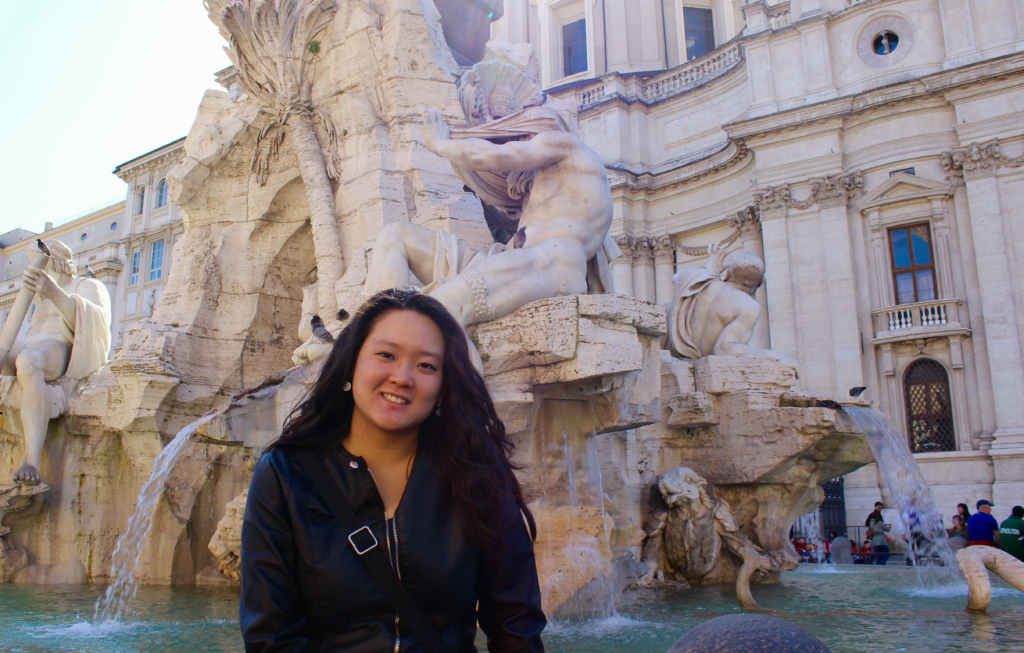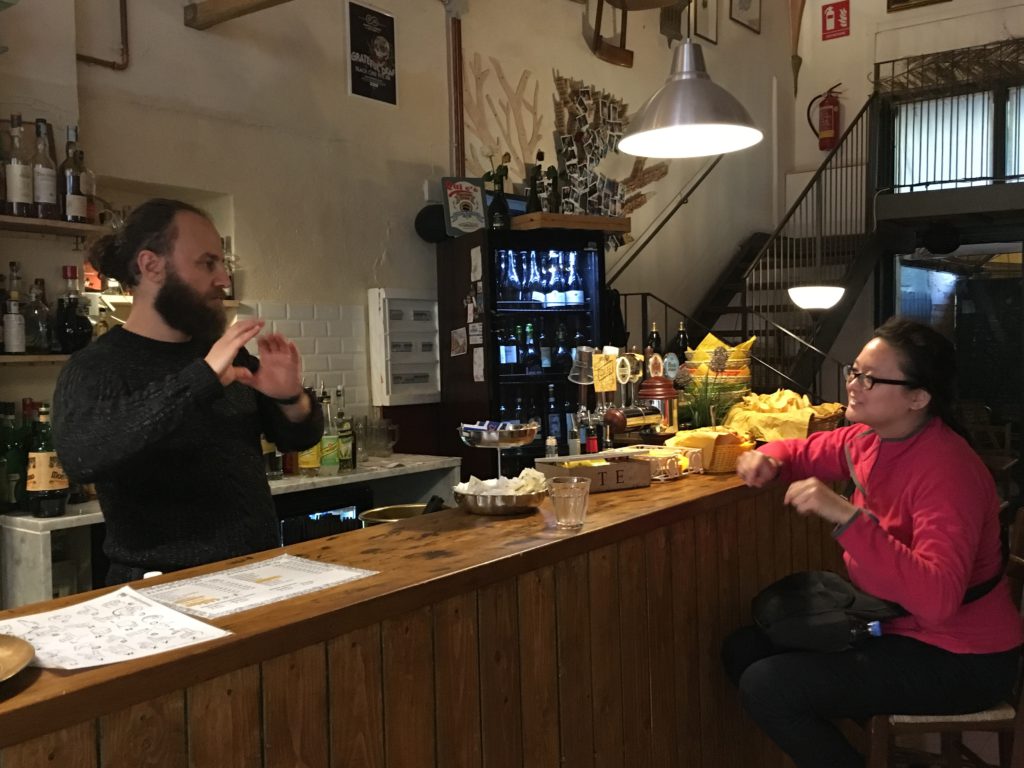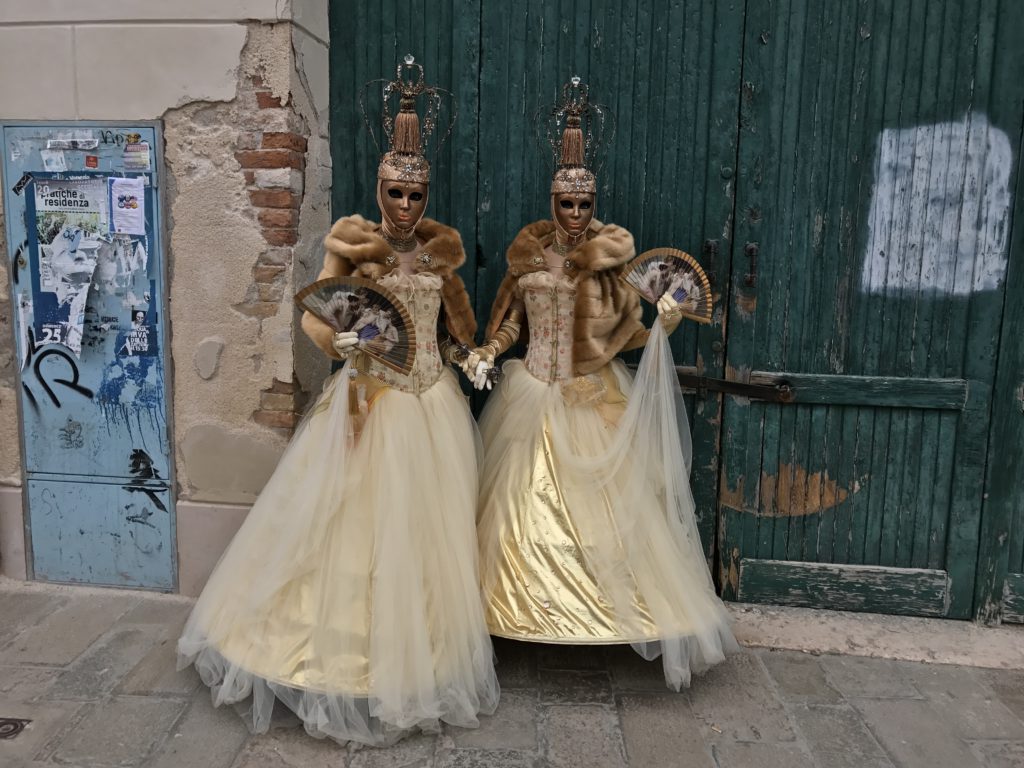
MIT alumna Sheila Xu writes on her experience as a deaf Fulbright U.S. Student Award grantee in Italy. She is based in Padua and Venice and is currently studying deaf Italian entrepreneurs.
By guest author Sheila Xu
I got hit with a travel bug when I spent a summer in Europe for my senior thesis project on deaf entrepreneurs between my junior and senior year at Massachusetts Institute of Technology (MIT). Since then, I became more interested in becoming a global citizen and traveling to other countries to experience their culture, language, and customs. I was also keenly interested in learning about life stories and circumstances of the deaf population in other countries. I was born deaf, and I grew up with a Cochlear Implant and speaking English, but I didn’t learn American Sign Language (ASL) until I was a college student.
I wasn’t satisfied with the idea of traveling to other countries and staying there for a short period. I wanted more than that. I wanted to be able to deeply immerse myself into the culture, learn the local language, and experience life the same as a deaf local would. The only way I can do that was to apply for a fellowship like the Fulbright U.S. Student Award for Study/Research.
I “discovered” Italy when I was a MIT student taking an Italian language and cooking class in the last semester of my senior year. I had an ASL interpreter who knew three languages (Italian, English, and ASL) to facilitate communication between my teacher, classmates and me. I learned how to cook Italian food and the basics of conversational Italian. After my graduation, I decided to go backpacking around Europe, including in Italy. In Italy, I met with deaf locals and learned some Italian and Italian Sign Language (LIS or Lingua dei Segni Italiana). I then decided to try to apply for grants and fellowships to be able to move to Italy. The Fulbright grant is one of the grants I applied to, along with one other grant I won prior to Fulbright to teach ASL to deaf locals in Venice.

While living in Italy for two years as a deaf foreigner, I’ve had my moments of ups and downs. Italy and the United States are very different in some ways, especially in areas of accessibility for the deaf. The deaf population in both the United States and Italy have a lot in common so it was very easy for me to find and connect to the deaf locals. I get to learn their language, understand their perspective on different issues, and walk in their shoes along with them.
However, sign language in Italy is not recognized and respected to the same extent as it is in the United States. I can’t request for a free sign language interpreter whenever I interact with the Italian government or use public services such as hospitals, doctor visits, and city halls. My Italian skills are not well-developed compared to my LIS skills. I can comfortably communicate in LIS without any issues, but the Italian language still poses some difficulties for me since there are very few formal opportunities for the deaf to learn the language in-depth either in the U.S. or in Italy. Self-studying is the way to go. Despite these setbacks, Italy has excellent food, affordable health care, warm and kind people, and other intangible qualities one would not experience in the United States. I wouldn’t trade my experiences in Italy for anything else. Only a deaf Fulbrighter can make the most of his or her experiences in Italy.
I was actually awarded the U.S.-Italy Fulbright Commission’s Fulbright Grant in Deafness Studies, which “allows graduate students to conduct research, to teach, and/or collaborate on new projects in deafness-related fields in Italy.” Italy is one of the few countries in the world to offer a Fulbright award specific to deaf studies. My Fulbright project focuses on deaf entrepreneurs in Italy and their success stories of establishing and operating businesses in Italy, as well as how Italy could encourage more deaf entrepreneurs. This project ties into my future ambitions to become a successful deaf entrepreneur, no matter where I am based in the world. Also, many deaf people are much less likely to be employed in a traditional setting than their hearing counterparts for many reasons, which leaves them reliant on welfare or unsatisfying jobs. I believe entrepreneurship is the way to go for many deaf people to achieve their own financial independence, lead a more satisfying life, and prove that we can do business as well as hearing people.

Here are tips for deaf students on planning to apply for a Fulbright grant, regardless of the host country:
1. Prepare your application early!
I started my Fulbright application in July because I was planning to apply through my university. Even if you have already graduated, you can apply through your alma mater where you earned your most recent degree. Most universities have an internal deadline in September to review your application, interview you, and submit the application to Fulbright in October. Don’t wait until the last minute to begin your application! The Fulbright application process is a very demanding and requires many components that can take time to gather.
2. Do not be afraid to ask for feedback or look for resources
I had at least 3 people looking at my application (including both my statement of purpose and personal essays) for in-depth feedback. They include people from the MIT Office of Distinguished Fellowships, my peers, and former Fulbrighters. Your alma mater may have a fellowships office and connections to former Fulbrighters, so don’t be afraid to go in to ask them for help with your application.
3. Choose a topic that interests both the U.S. and host country’s government
Both the U.S. and host country’s government are funding your Fulbright award. Naturally, they would be more inclined to fund a project that concerns the interests of both governments. For example, my topic was about researching deaf entrepreneurs in Italy and how they establish and operate businesses in a nation with a disproportionate number of unemployed deaf Italians. This research is of interest to both Italy and the U.S. because both countries are interested in reducing unemployment across all demographics, including deaf people. A high number of unemployed people in a country means less general economic activity and less taxes paid into the government. Also, while this topic may interest both governments, this topic is deeply personal to me and the other deaf entrepreneurs I met during my research period. We want to see members of our cherished deaf communities putting their talents to their fullest potential and making the most of the opportunities in their personal circumstances to lead more fulfilling lives.
4. Choose an interesting and relevant topic
Don’t choose a topic that’s already well-researched. You’re better off proposing a new, exciting topic that’s interesting and timely. For example, there has been an increase in Fulbright awards for the study of migration and refugees in Italy and the European Union in light of the recent refugee crisis in the EU. That’s a hot topic now for sure!
5. Choose a topic that you are passionate about
If you aren’t passionate about your proposed project or topic, the Fulbright application reviewers aren’t likely to fund you. You must convince them that you are passionate enough about your proposed project and will follow-through the project to its completion since most Fulbright commissions will not require a written, detailed report at the end of the grant period. Applicants should demonstrate their interest in the project they are proposing through related course choices, papers they’ve written, books they’ve read, projects and volunteer activities. The proposed topic should make sense based on your past experience.
Also, your personal statement essay is your opportunity to showcase how your past experiences mesh with your proposed project. In other words, tell a personal story that touches the selection committee’s hearts. What impacted you and made you passionate about your proposed project? How are you extraordinary? How will this project help you realize your potential for greatness?
6. Choose a topic that showcases your unique skills that aren’t available in the host country
Our experiences as deaf people provide us with unique skills. We learn how to become adept communicators in most situations, find our ways around barriers, and have a tight-knit deaf community around the world we can easily integrate with. Hence, the skills we gained from our lived experiences as deaf people can be advantageous in Fulbright applications. You should mention these and also mention other skills and experiences that are unique to you. Also mention skills and experiences that will be in demand in your host country.
For example, for my deaf entrepreneurs project, I was able to show that I have an extensive background in researching deaf entrepreneurs in both the U.S. and Europe because of my senior thesis. Also, I had stated in my application that no one has done a project like this in Italy, nor is there a person currently working on this topic. In fact, there is very scant literature or projects on deaf entrepreneurs around the world. This topic was my opportunity to show that I can make a contribution to Italy that no one else could.
With only one or two pages to write out your project and personal statement, every word counts to convey the value you will bring, no matter how small. Show how you are extraordinary!
7. Secure solid affiliations
This is one of the most important components of the Fulbright application. Your letter of affiliation will vouch for you, your skills, and the feasibility of your project. Let’s put this another way: the Fulbright application reviewers want to see if you are able to produce good results within the 9-month period of the fellowship, which is not a lot of time. You need to be able to hit the ground running with the right support and structure from your host university or organization.
8. Be a good sport
The Fulbright application reviewers will also look at your character and whether you will be a good ambassador for the United States. They don’t want to send Americans abroad who will leave a negative impression on the people in the host country. The mission of the Fulbright is “cultural diplomacy” or “soft diplomacy” between the U.S. and countries around the world. Your letters of recommendation and personal statement should attest to your personal character including your personality, adaptability and humility.
In my personal statement, I mentioned my love for traveling and learning about other cultures. I mentioned my solo backpacking around Europe and meeting deaf people in each of the countries I visited. This demonstrated how I could be a good ambassador for the United States.
Sheila Xu has a Bachelor of Science in Humanities (Science, Technology, and Society) and Science (Earth, Atmospheric, and Planetary Sciences) from Massachusetts Institute of Technology (MIT). She is currently studying deaf entrepreneurs in Italy on a Fulbright grant in Deafness Studies. Sheila can be reached at [email protected] for consultations with Fulbright applicants.
© Victoria Johnson 2016, all rights reserved.